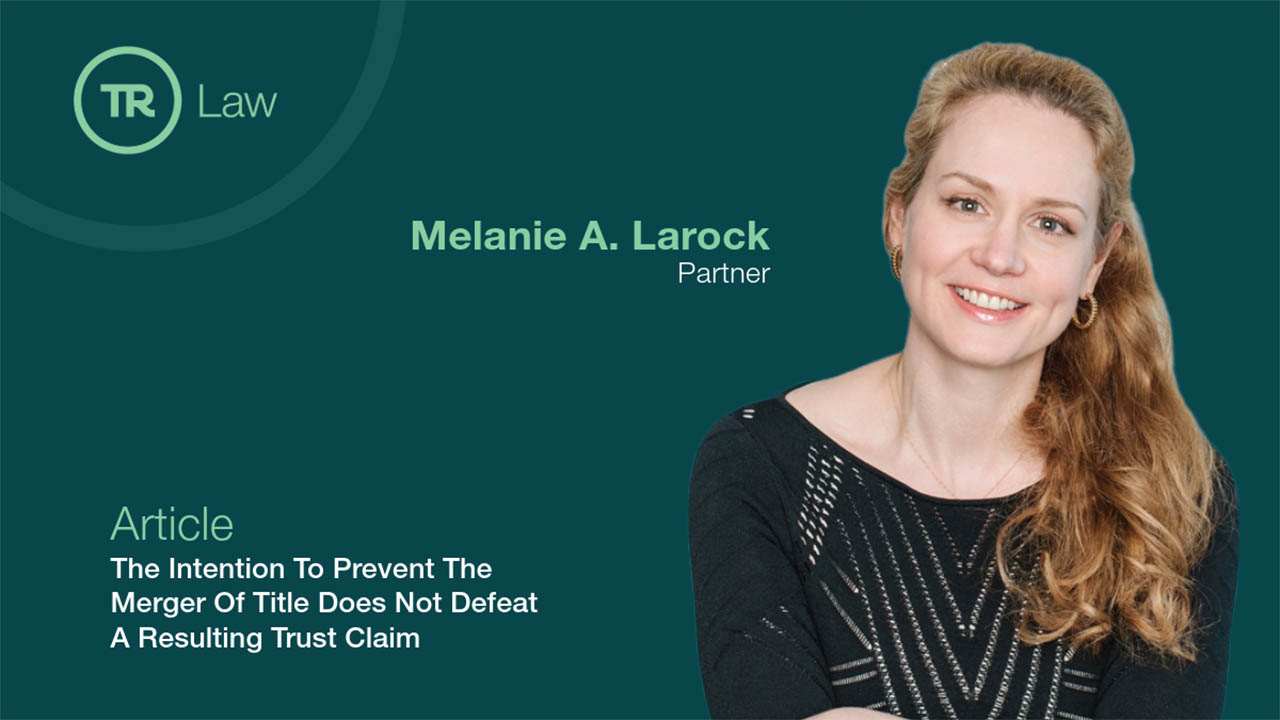The Intention To Prevent The Merger Of Title Does Not Defeat A Resulting Trust Claim
Author(s): Melanie A. Larock*
April 2, 2024

Take a coffee break with Melanie Larock and read a weekly blog post about family law decisions released by the Court of Appeal for Ontario.
In Falsetto v. Falsetto, 2023 ONCA 469 (CanLII) | Falsetto v. Falsetto | CanLII (released on February 27, 2024), the Court of Appeal for Ontario held that an intention to avoid the operation of the Planning Act and the merger of title does not rebut the presumption of resulting trust. In this case, a property was jointly registered in the names of the Husband and Wife. The Husband owned an adjacent property registered solely in his name. The parties separated, and the Husband’s Father advanced a resulting trust claim against his former daughter-in-law, claiming that she was only holding title to the property in trust for him as he contributed 50% of the funds to purchase the property.
The lower court held that the father-in-law intended to gift the daughter-in-law a 50% interest in the property because he intended to avoid the adverse consequences of the merger under the Planning Act. The Court of Appeal reversed that finding and held that the father-in-law had a 50% beneficial interest in the property, and the presumption of resulting trust was not rebutted.
The property in question was adjacent to the property the Husband already owned. Due to the Planning Act, if the Husband took title to the property in question in his name alone, the merger of the two properties into a single parcel of land would have occurred. The Husband and his Father did not want this to occur, so they followed their real estate lawyer’s advice to add another party to the title of the newly purchased property to avoid a merger. The intention was initially to name the Father as a joint owner. However, shortly before closing, the bank declared that there was insufficient time to approve the Father under the mortgage. To save the transaction, the Husband and Father decided to add the Wife to the title as a joint owner to avoid a merger.
It was undisputed that the father-in-law paid 50% of the down payment and all closing costs and 50% of the mortgage and other carrying costs after the purchase. The Wife made no financial contribution to the purchase or maintenance of the property. After the Husband and Wife separated, the Wife claimed that she was a 50% owner by virtue of being registered on the title and the mortgage. The lower court held that the intention to prevent the merger of titles was consistent with a gift.
It was clear that the presumption of resulting trust applied. However, the lower court had concluded that “a party cannot achieve one result for the purpose of avoiding a legal consequence prescribed by statute – in this case, the Planning Act to achieve the opposite result for other purposes.” The lower court effectively found that such an intention barred a resulting trust claim.
The Court of Appeal disagreed. The ultimate consideration is the transferor’s actual intention at the time of the transferor on a case-by-case basis. The Court of Appeal held that the father-in-law’s intention to avoid merging of title did not mean that he intended to gift the property to his former daughter-in-law. He intended to purchase an investment property with his son and intended to avoid a merger by having his daughter-in-law registered on the title while retaining beneficial ownership.
The Court of Appeal dismissed an argument by the appellant that the father-in-law’s failure to transfer the former daughter-in-law’s interest to him prior to separation supported a gift. The Court of Appeal rejected that argument: “What would the point of such a transaction have been? The property had been purchased. Income was received. Expenses were paid. The state of affairs was entirely satisfactory to Luigi. There was no apparent reason for anyone to incur additional transaction costs – including land transfer tax – for no perceived benefit.”
The Court’s comments are helpful as it is common to not challenge the issue of ownership until after a separation when a dispute crystallizes.
About Melanie Larock
Melanie Larock is a family law litigator and a partner in Thomson Rogers’ Family Law group. Melanie’s focus is on all areas of family law, with a particular emphasis on complex financial issues and high-conflict parenting disputes. Melanie was trained by an illustrious litigator, and she is a self-proclaimed evidence law nerd.
Share this






